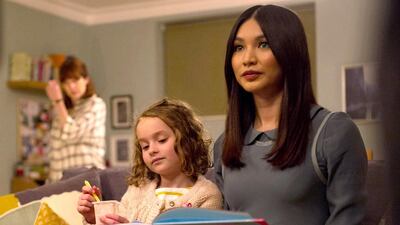The hit series Humans, which has premiered in the region to correspond with the UAE launch of the online streaming service Starz Play, is set in a parallel world, in which advanced robots, or synths, perform all menial tasks for their human masters.
The drama is written by Sam Vincent and Jonathan Brackley (Spooks), with a cast headed by Tom Goodman Hill and William Hurt. The show explores the relationships between synths and humans, and the very concept of what it is to be human. It is based on the award-winning Swedish sci-fi drama Real Humans, and is a transatlantic co-production between the United Kingdom's Channel 4 and American cable-TV giant AMC.
Can you tell us a little more about the concept behind Humans?
Sam Vincent: Humans is set in a parallel present – or a world just around the corner, if you like, which looks and feels exactly like the world we live in, but for the one extraordinary difference that there are these highly lifelike androids in many, many homes and workplaces. They're highly advanced, but they don't think or feel – they are simply here to serve, as home help, carers for the elderly, and perform an endless array of menial jobs. The world has come to rely on them and increasingly the economy is becoming reliant on them, too.
What did you do in the way of research? Did you investigate the science behind artificial intelligence?
SV: We did a lot of reading, we attended a couple of debates and talks, but principally reading. We read a lot. One book that was highly technical but particularly helpful was Nick Bostrom's Superintelligence.
There have been some well-publicised concerns recently that AI may pose a threat to humanity. Do you think advances in this area are positive, or are we going to be wiped out?
SV: Having done a lot of reading on this, you will discover that the quieter voices are quiet for a reason. The alarmist voices grab a lot of media attention. The really interesting question here is, what is anyone going to do? Are they really going to put the brakes on this research?' That seems like something that has never happened before in the history of scientific development. Are they just going to pull back from the brink? It's going to continue down that road. I would say that I'm an optimist about it. I don't think anything will be wiped out anytime soon. However, what it's going to do to us, as people, is a much more complex question. That is something that we're trying to explore in this series. We're not so much dealing with the imminent annihilation of the human race as exploring what's going to happen to us. How will it change us?
It's quite a well-trodden path, the idea of robot underlings becoming our overlords. But this story doesn't go down that line, exactly, does it? It's not another 2001 or I, Robot.
Jonathan Brackley: I think it's more grappling with the philosophical ideas of what it means to be human. Does artificial intelligence necessarily mean that you're becoming more – a greater sort of intelligence? Those are the ideas we're looking to explore in the show, as opposed to androids versus humans. How we can live together, how we can integrate, what that means for both sides. Is our work part of what makes us who we are? And if we're giving that over to something else, to do our jobs for us, our professions, or our washing and cleaning and cooking and looking after our children, what does that mean for us – if we're giving that much of ourselves away? Are we becoming less, and they're becoming more?
You must have been thrilled when the casting proved so fruitful.
SV: Yeah. We've been very lucky and, of course, an actorsuch as William Hurt brings an extraordinary presence to the show. You have an actor like that, you're able to articulate quite complex ideas. The entire cast is brilliant ... not least the actors who are actually playing the synths themselves. There are so many pitfalls to avoid and they have avoided all of them.
JB: We really wanted to avoid clichés of robothood that you’ve seen in other TV and films. No quizzical head-cocking or anything like that. We described their movement as like a Japanese tea ritual – all grace and economy of movement. No movement is wasted.
If and when we end up with this brave new world, and we all have our own synths, what one menial task are you looking forward to never having to do again?
SV: It’s so complicated. I’d be tempted to say changing nappies, but would I really want to have an artificial person having such an intimate moment? I know – wiping down my son’s high chair. On the days when I have to do that three times a day, I would give anything not to do it for the third time.
JB: I’ve got a three-month old daughter, so I’d say washing bottles. It’s the most boring and terrible thing in the world and my hands are a mess.
• New episodes go live on Starz Play every Monday at noon. Previous episodes can be viewed on demand. Visit www.starzplay.com for more details
artslife@thenational.ae

